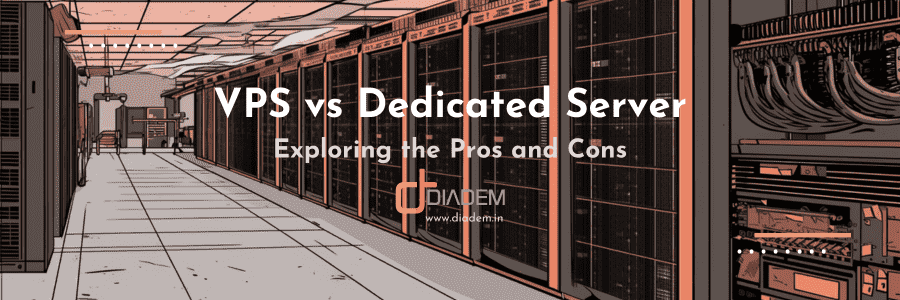When it comes to choosing the right hosting plan for your website, it’s essential to understand the differences between the various options available. Among the most popular hosting choices are Virtual Private Server (VPS) hosting and dedicated web hosting. Both options have their merits, but which one is the best fit for your needs?
In this post, we will delve into the details of VPS vs dedicated Server hosting, comparing the key differences and helping you make the most informed decision for your website.
Introduction to VPS Hosting
A Virtual Private Server (VPS) is a hosting solution that provides a balance between shared and dedicated server hosting. In VPS hosting, multiple websites share the same physical server, but each site has its own dedicated resources, such as RAM and bandwidth.
This is achieved using a hypervisor, which is a software that divides the cloud server’s resources into virtual machines for each customer on the server. While the accounts share the same server, they are completely isolated from one another, offering enhanced security and performance compared to shared hosting server solutions.
VPS hosting is an ideal choice for small to medium-sized businesses or personal websites that require more resources than shared hosting platforms can provide but don’t need the full power and control of a dedicated server.
Introduction to Dedicated Hosting Server
If you plan to host a dedicated server in India the entire physical single server is dedicated solely to your website. This means you have complete control over the server’s hardware and software, and you don’t have to share any resources with others.
Most dedicated servers provide the highest level of application/website performance, security, and customisation, making it an excellent option for high-traffic websites, e-commerce stores, or businesses with unique hosting requirements.
However, a Dedicated server hosting solution comes with a higher price tag and may require more technical expertise to manage and maintain compared to VPS and shared hosting.
Key Terms: Managed vs Unmanaged and Cloud VPS Hosting
When considering VPS vs dedicated server hosting plans, it’s important to understand the terminology related to these hosting services types:
Managed vs Unmanaged VPS and Dedicated Servers
Both VPS and dedicated servers come in two forms:
-
Unmanaged
-
Managed
An unmanaged VPS or dedicated server provides you with the basic hardware, but you are responsible for setting up and maintaining the server. This includes installing the necessary software, such as PHP, a web server (Apache, Nginx, or LiteSpeed), and other components required to run your website. Unmanaged hosting is typically more complex and suitable for developers or technical users.
On the other hand, a managed VPS or a managed dedicated server offers a more hands-off approach. In this scenario, your hosting provider takes care of configuring, managing, and maintaining the server on your behalf. While managed hosting servers come at a higher cost than unmanaged servers, the added support and ease of use make it a worthwhile investment for non-technical users.
VPS Hosting vs Cloud VPS Hosting
Another term you may encounter when exploring hosting options is cloud hosting or cloud VPS hosting. Cloud server hosting uses the same basic principle as traditional VPS hosting, with one key difference:
-
Traditional VPS: Your site gets its dedicated resources from part of a single physical server.
-
Cloud VPS: Your site gets its dedicated resources from multiple servers (the “cloud”).
Many hosting providers have transitioned to cloud VPS solutions, as they offer greater flexibility and scalability compared to traditional VPS hosting. However, for the purposes of this guide, we will treat VPS and cloud server VPS hosting as essentially the same.
Pros and Cons of VPS Hosting

When comparing VPS vs dedicated server hosting, it’s essential to weigh the pros and cons of each option. Here are some key advantages and disadvantages of VPS hosting:
Pros:
![]() More affordable than dedicated hosting
More affordable than dedicated hosting
![]() Dedicated resources for your site, even though you don’t have the full physical server
Dedicated resources for your site, even though you don’t have the full physical server
![]() Easier to scale your hosting resources, especially with a cloud VPS
Easier to scale your hosting resources, especially with a cloud VPS
Cons:
![]() Limited control over the server’s physical hardware
Limited control over the server’s physical hardware
![]() Potentially less secure than dedicated hosting, as your site shares one physical server with other users
Potentially less secure than dedicated hosting, as your site shares one physical server with other users
Pros and Cons of Dedicated Hosting
Dedicated hosting also has its own set of pros and cons to consider
Pros:
![]() Full control over your server’s security software and physical hardware
Full control over your server’s security software and physical hardware
![]() Improved security and performance, as your site is physically isolated on its own server
Improved security and performance, as your site is physically isolated on its own server
Better suited for high-traffic websites or those with unique hosting requirements
Cons:
![]() Significantly more expensive than VPS hosting
Significantly more expensive than VPS hosting
![]() Can be more difficult to accurately assess resource needs, and harder to change resources compared to VPS hosting
Can be more difficult to accurately assess resource needs, and harder to change resources compared to VPS hosting
VPS vs Dedicated Server: Performance Comparison
When it comes to website performance, dedicated web hosting generally offers a higher level of resources and faster loading speeds compared to VPS hosting. Since dedicated hosting companies provide you with an entire single web server and its resources, your website can handle more traffic and process data more efficiently.
In contrast, VPS hosting offers dedicated resources within a shared server hosting environment. While this can still result in improved performance compared to shared and dedicated hosting, it may not be sufficient for websites with extremely high traffic or resource-intensive applications.
In the end, the performance of your selected hosting plan hinges on your website’s unique needs. If you foresee substantial growth or variations in traffic, opting for a Linux dedicated server could be the ideal solution to guarantee steady performance.
VPS vs Bare Metal: Security Comparison

Website Security is a critical factor in choosing a hosting plan, as it can directly impact the safety and reliability of your website. Dedicated hosting offers superior server security due to the physical isolation of your server from other users. This means that any security breaches affecting other users on the same server will not impact your website.
VPS hosting offers higher security than shared hosting but is less secure than dedicated hosting. Unlike dedicated servers, VPS involves sharing physical hardware, posing potential security risks. However, VPS provides virtual isolation, separating your site from other users for enhanced security compared to shared hosting solutions.
When choosing between VPS and dedicated hosting, it’s essential to consider the specific security needs of your website. If you handle sensitive customer data or operate an e-commerce store, a dedicated server may provide the enhanced security necessary and complete control to protect your site and its users.
When it comes to security, we provide DDoS Dedicated server hosting that offers the highest level of protection through dedicated hardware resources and advanced DDoS protection.
Shared Hosting vs Dedicated Hosting: Customisation and Scalability

When it comes to customisation and scalability, both VPS and dedicated hosting offer various levels of control and flexibility. With a VPS, you have a certain degree of customisation, as you can access your server files and install software to suit your website’s needs. However, VPS hosting may have limitations in terms of storage and memory allocation, which could restrict the installation of large software packages or configurations that could impact other users on the server.
Dedicated hosting, on the other hand, provides full control over your server’s software and hardware, allowing you to customise the server to meet your unique needs. This level of customisation can be especially beneficial for websites with specific requirements or rapidly growing businesses that need to adapt to changing demands. We provide Windows dedicated servers, catering to clients who require a Windows-based infrastructure.
In terms of scalability, you can opt for an alternative to aws scalable hosting solution which offers a more flexible approach, as you can easily increase your server resources to accommodate traffic surges or growth. Conversely, dedicated hosting may require physically adding additional drives or resources to the server, which can be more time-consuming and costly.
Shared Hosting vs Dedicated Server: Pricing Comparison
One of the most significant differences between VPS and dedicated hosting is the cost. VPS hosting is generally more affordable, as the operational costs are distributed among multiple users sharing the same server hardware. This makes VPS hosting a cost-effective solution for small to medium-sized businesses or personal websites with growing traffic.
Dedicated hosting, on the other hand, can be quite expensive due to the exclusive use of an entire server and its resources. This higher cost may be justified for large-scale applications, such as e-commerce websites or businesses with unique hosting requirements. However, for many users, the benefits of dedicated hosting may not outweigh the additional costs.
For users seeking a more affordable option for dedicated hosting solutions without compromising on performance and reliability, we recommend our affordable options for cheap dedicated server hosting.
When comparing VPS vs dedicated server hosting pricing, it’s essential to consider your website’s needs and budget. While dedicated hosting offers more resources and control, VPS hosting can provide a more affordable option with sufficient performance and customisation for most websites.
How to Choose Between VPS vs Dedicated Server

Deciding between VPS and dedicated hosting ultimately depends on the specific needs and requirements of your web hosting. Here are some factors to consider when choosing between these hosting options:
-
Website size and traffic: If you have a small to medium-sized website with moderate traffic, VPS hosting may be sufficient. However, if you anticipate significant growth or have a high-traffic website, dedicated hosting may be a better option for ensuring consistent performance and stability.
-
Security requirements: Dedicated hosting offers enhanced security due to the physical isolation of your server. If your website handles sensitive customer data or requires advanced security measures, a dedicated server may be more suitable.
-
Customisation and scalability: While both VPS and dedicated hosting offer customisation options, dedicated hosting provides greater control over your server’s hardware and software. If you need to rapidly scale your resources or have specific configuration requirements, dedicated hosting may be the better choice.
-
Budget: VPS hosting is generally more affordable than dedicated hosting, making it an attractive option for small businesses or personal websites with limited budgets. However, if you require the advanced features and performance of a dedicated server, you may need to allocate a larger portion of your budget to your hosting plan.
In conclusion, the choice between VPS vs dedicated server hosting depends on your website’s specific needs, requirements, and budget. By carefully considering the factors outlined in this guide, you can make the best decision for your website and ensure its long-term success. We also provide the option of a Dedicated Cloud Server, which offers the benefits of dedicated resources and the scalability of a cloud environment.
Ready to dive deeper into the world of hosting? Let’s connect!Schedule a consultation meeting with our hosting experts today
|































